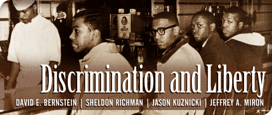David Bernstein writes that my reaction essay showed “no noticeable qualms about the vast expansion of the antidiscrimination edifice since 1964.” As the saying goes, absence of evidence isn’t evidence of absence. I do have qualms about these laws, but I wouldn’t lay the blame for them so squarely on Title II.
I also didn’t bring up any other antidiscrimination laws because (1) they weren’t properly speaking the subject of this issue and (2) they are relatively easy for me to argue against, on all possible grounds. As I argued earlier, we can evaluate a law on the basis of its observed effects, its coherence with our ideology, or its constitutional standing.
Most other nondiscrimination laws are a lot more dubious constitutionally. Race is mentioned by name in the U.S. Constitution, and it is impossible to understand the legislative history of the Fourteenth Amendment without recognizing that it was intended to combat racial inequality.
In this context, the federal government is clearly empowered to act against racial discrimination in many areas. We can argue about which areas are proper, of course, and to some extent that’s what we’re doing here. But no other form of discrimination gets similar constitutional treatment or should be understood to occupy a similar place.
Second, these other antidiscrimination laws’ effects on society are surely not as beneficial as racial nondiscrimination, which helped to right the greatest wrong in our country’s history. If you’re not already convinced of the beneficial effects of racial antidiscrimination law, this claim obviously won’t be convincing either. But to my mind, the federal government tried very hard beginning with the end of the Civil War to get us to something like what we have today. Every other effort failed. This one worked. It takes a remarkable confidence in a counterfactual scenario to say that even this last, apparently successful effort was in vain.
Finally, other forms of antidiscrimination law are also much harder to square with my ideology, which privileges simple, easy-to-understand laws, laws well supported by social norms and community understandings. “Don’t consider a person’s race in hiring” is easy to understand. “Be careful not to appear to discriminate against motorcycle gang members” is just… puzzling. Do I ask if you’re a member? Do I not ask? How many gang members, roughly, is enough for me to hire to be above all possible suspicion? Are there hiring practices that would have the effect of discriminating against gang members, practices I might want to discuss with my HR director? As the owner of a business, I’d want answers to these imponderables. With race, these aren’t imponderables. There’s a meaningful difference here.
Likewise, with discrimination against gays and lesbians, I am a skeptic that the law has much of a constructive role to play. The Human Rights Campaign monitors the GLBT policies of America’s largest companies, and the last twenty years have seen these wealthy, powerful corporations scramble to provide equality. Privately! This, to my mind, is wonderful.
This, though, is also where I’d suggest that discrimination against GLBT people works differently from racial discrimination. Nearly all non-heterosexuals can “pass” — that is, they can appear normal when they need to. They can build trust, and then, if appropriate, they can divulge their group membership. That’s an act that changes minds in a way few others can. Most people who are in a racial minority, however, can’t pass. This makes a big difference, and there are many others besides.
Indeed, we could go on talking about these differences for a long, long time. Doing so would give ample reason for doubt about other nondiscrimination laws while keeping racial nondiscrimination in place. And there seems to me even less reason to worry about whether racial antidiscrimination laws have encouraged, for example, smoking bans.
The nanny state would have existed with or without Title II, and so it seems incorrect to me to find the first step of the slippery slope here of all places. Why not start with the New Deal? Or with eugenics and anti-miscegenation laws? Or with Prohibition? The nanny state has always been with us, hasn’t it? Why blame this one law in particular? The genie is out of the bottle, as it surely would have been in any case.
So what can we do? Well, we can try to draw the borders right at the forms of discrimination that the Constitution really does empower the government to stop — discrimination by race, perpetrated by common carriers, directed by the local governments, or (I’d argue) directed by agents acting in all respects as a government, through their systematically unpunished use of coercion.
This gets us a long, long way, but it still doesn’t get us near smoking bans or motorcycle gang antidiscrimination laws. Which is to say, we end up in pretty much the right place.
A Side Note on Hayek
Bernstein also suggests that hate speech laws would be Hayekian, too, but here I disagree. Hayek stressed repeatedly the importance of being able to communicate even highly unpleasant ideas, and being able to live even lifestyles that the majority considers morally repulsive. He very clearly limits the proper scope of legislation to actions directed toward others. Mere words don’t make the grade.
But the reason I brought up Hayek is merely to make Title II a bit more thinkable to libertarians. Other ways exist. We could, for example, invoke Robert Nozick’s theory of property acquisition — which requires compensation to those who are wronged. Who better to extract compensation from than those who racially discriminate?
We need to think along these lines not because it will make libertarians popular. There’s something deeply embarrassing, to be honest, about having this sort of cogitation in public. But we need to do it anyway, because the world has moved on, and because it certainly appears that one thing our intellectual ancestors insisted on has been falsified.

